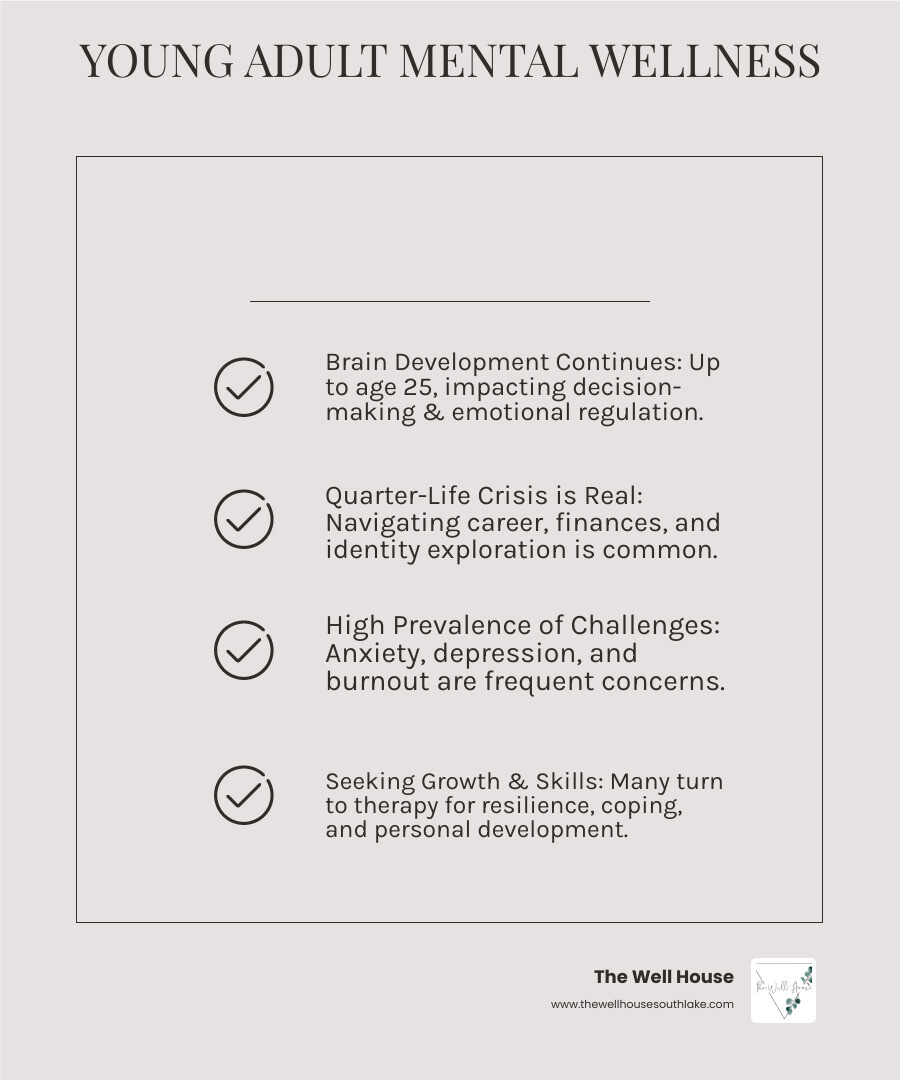Young Adult Therapy Near Me: Your Guide to Local Mental Wellness
Why Young Adulthood Is Hard—And Why You Don’t Have to Face It Alone
Finding a young adult therapist near me can feel overwhelming. Here’s how to start:
Quick Steps to Find Local Young Adult Therapy:
- Search online directories like Psychology Today or local counseling centers.
- Check credentials for licensed professionals (LPC, LCSW) specializing in ages 18-29.
- Consider your needs, such as anxiety, life transitions, or relationship issues.
- Verify insurance or sliding scale options for affordability.
- Schedule a free consultation to assess fit before committing.
Your twenties and thirties are often portrayed as a time to have it all figured out, but the reality is often messy. Career uncertainty, relationship changes, and financial stress can leave you feeling stuck or anxious.
You’re not alone. The “quarter-life crisis” is a real phenomenon. During this developmental stage, you’re navigating major life transitions while your brain is still maturing, leading to unique mental health challenges. Many young adults seek therapy not because something is “wrong,” but to build skills for thriving.
Therapy for young adults is proactive. It’s about learning to cope with stress, regulate emotions, set boundaries, and build confidence. Whether you’re dealing with anxiety, depression, or simply feeling lost, therapy offers a space to process, heal, and grow. Finding a therapist who understands the unique pressures of young adulthood can make all the difference.
I’m Jennifer Kruse, a Licensed Professional Counselor Supervisor in the Dallas-Fort Worth area. I’ve helped many young adults find clarity and resilience. My holistic approach integrates emotional, physical, and spiritual wellness to help you become the person you want to be.

Young adult therapist near me glossary:
Why Young Adults Are Turning to Therapy
Young adulthood—roughly ages 18 to 30—is a period of incredible growth, but it can also be exhausting and confusing. That’s why more young adults are turning to therapy not just for crisis management, but for proactive personal development and to build a foundation for long-term well-being.

Navigating the “Quarter-Life Crisis” and Major Life Transitions
The quarter-life crisis is a real phenomenon marked by intense self-doubt and the pressure to “settle down” while navigating constant change. It often shows up during major life transitions:
- Career choices and uncertainty can feel paralyzing, whether you’re starting a new job or realizing your current path isn’t right.
- Financial independence brings new stress, from managing student loans and budgets to saving for the future.
- Academic pressure in college or graduate school can feel relentless. Many students find therapy to be a crucial lifeline.
- Relationship changes, including shifting friendships and romantic partnerships, require significant emotional energy.
- Identity exploration raises questions like “Who am I?” and “Where do I belong?” that can lead to confusion and anxiety.
Working with a young adult therapist near me provides a safe space to unpack these experiences and gain tools to steer transitions with confidence. For more on managing daily pressures, see our insights on Stress Management for Young Adults.
Common Mental Health Challenges in Your 20s and 30s
Young adults face specific mental health challenges that are common responses to the pressures of this life stage.
- Anxiety is prevalent, showing up as general worry, social anxiety, or panic attacks, often fueled by the pressure to succeed. For targeted help, see our resources on Social Anxiety in Young Adults and our Anxiety & Depression Counseling in Southlake.
- Depression can manifest as sadness, hopelessness, or a loss of interest, stemming from isolation or the weight of adult responsibilities.
- Perfectionism and imposter syndrome create a nagging feeling of inadequacy that can be paralyzing.
- Burnout from the relentless pace of modern life can lead to complete emotional, physical, and mental exhaustion.
- Relationship issues, from communication problems to setting boundaries, can cause significant distress.
Seeking help for these challenges is a sign of strength. Therapy provides a structured environment to develop coping strategies and learn emotional regulation skills.
The Benefits: Building Skills for a Resilient Future
Working with a young adult therapist near me is an investment in your long-term well-being. It equips you with a practical toolkit for life.
- Develop healthy coping mechanisms to manage stress and difficult emotions.
- Learn emotional regulation to understand and respond to your feelings without being controlled by them.
- Build self-esteem and confidence by challenging negative self-talk and recognizing your strengths.
- Improve communication skills to express your needs and feelings clearly in relationships.
- Learn to set healthy boundaries to protect your energy and prevent burnout.
Therapy empowers you to build resilience and gain the clarity to reconnect with your authentic self. For more guidance, explore our Young Adult Guide: When It Gets Real, Get Real Help.
How to Find a Young Adult Therapist Near Me: A 5-Step Guide
Finding the right young adult therapist near me is about finding a good fit. Taking an active role in the search is empowering and doesn’t have to be overwhelming. Here’s a guide to help you find the best match.

Step 1: Know What You’re Looking For (Qualifications & Approach)
First, clarify what kind of support you need. Look for credentials like LPC (Licensed Professional Counselor), LCSW (Licensed Clinical Social Worker), or PhD/PsyD (Psychologist). All are qualified to provide therapy. Also, consider therapeutic approaches. CBT (Cognitive Behavioral Therapy) is effective for anxiety, while DBT (Dialectical Behavior Therapy) helps with intense emotions. At The Well House, we specialize in holistic therapy, integrating mind, body, and spirit. Most importantly, find a therapist who specializes in working with young adults. Our Therapy for Emerging Adults is designed for this pivotal time.
Step 2: Explore Different Types of Therapy
Consider which therapy format fits your life:
- Individual therapy offers a private, one-on-one space for deep personal work.
- Group therapy can be powerful for issues like social anxiety, helping you realize you’re not alone.
- Family counseling can help improve communication and dynamics, even as an adult.
- Online therapy provides flexibility and convenience. We offer Online Therapy for Students and other young adults, which is especially valuable for those with demanding schedules, like in our Therapy for Graduate Students program.
- Other specialized approaches include EMDR for trauma and somatic therapy for the mind-body connection.
Step 3: Consider the Logistics: Cost and Affordability
Cost is a common concern, but don’t let it be a barrier. Several options can make therapy affordable:
- Ask about sliding scale fees based on your income.
- Check your insurance coverage for mental health services, including out-of-network benefits.
- Some practices offer lower rates with supervised student interns.
- Community mental health centers or government mental health resources may offer low-cost services.
We believe everyone deserves access to support. Check our FAQ for more about payment options.
Step 4: Schedule a Consultation to Find the Right Fit
Most therapists offer a free 15-20 minute consultation. This is a crucial step to see if you’re a good match. During the call, pay attention to:
- Rapport: Do you feel a connection? The client-therapist relationship is a key predictor of success.
- Questions: Ask about their experience with young adults, their approach, fees, and session logistics.
- Personality: Does their style resonate with you? We aim for an approach that is honest, compassionate, and allows you to be authentic.
Trust your instincts. If it feels right, you’re on the right track. You can schedule a consultation with us via our Contact Us page.
What to Expect from Therapy for Young Adults
You’ve scheduled your first session—now what? Let’s explain the process and explain what makes therapy for young adults unique.

How is it Different from Therapy for Teenagers?
Therapy for young adults is custom to your current life stage, not your teenage years.
- Focus on Independence: Unlike teen therapy, which may involve parents, young adult therapy centers on your independence, adult responsibilities, career path, finances, and relationships.
- Complete Confidentiality: Once you’re 18, your therapy is completely private (barring immediate safety risks). This creates a space for total honesty.
- Understanding Brain Development: Your brain’s prefrontal cortex is still developing until about age 25. A therapist specializing in young adults understands how this neurological development impacts your decision-making and emotional processing.
- Practical Life Skills: Therapy often includes practical coaching on topics like negotiating a salary or navigating healthy relationships, integrated with emotional work.
For younger family members, our Teen Counseling: A Judgment-Free Zone in Southlake, Texas offers age-appropriate care.
Your First Session and Beyond
Here’s what to expect as you begin your therapy journey.
Your first session is an intake, where we’ll get to know you, discuss what brought you to therapy, and understand your history and stressors. Together, we’ll start identifying goals, which can be anything from feeling less anxious to gaining clarity on a major life decision. These goals can evolve as you do.
Most people start with weekly sessions to build momentum. As you progress, we can adjust the frequency. At The Well House, we offer both in-person sessions and flexible telehealth options via secure video or phone. Online therapy is proven to be just as effective and removes barriers like commute time.
Building trust takes time. Therapy is a relationship that develops gradually. Our commitment is to create a safe, non-judgmental space where you can be vulnerable at your own pace. Some sessions will be heavy, others might include laughter—we’re here for all of it.
Our Southlake Counseling Services are designed to be flexible and accessible, helping you build the resilient, authentic life you want.
Frequently Asked Questions about Finding a Young Adult Therapist
Starting therapy can bring up questions. Here are some common ones we hear from young adults.
How do I know if I really need therapy?
Therapy isn’t just for crises. Many people seek it for personal growth or to manage daily stress. You might benefit from therapy if you’re feeling overwhelmed, struggling with difficult emotions, navigating repetitive relationship patterns, or simply feeling stuck.
It’s also for anyone seeking self-understanding. Questions like “Who am I?” or “What do I want from my life?” are valid reasons to seek support. If you’re curious about yourself and want to explore your inner world with a professional, that’s reason enough. Our Stress Therapy in Southlake can help you develop healthier coping mechanisms. The bottom line: if you’re asking the question, the curiosity is worth exploring.
What’s the difference between a therapist, a counselor, and a psychologist?
Understanding mental health titles can be confusing. Here’s a simple breakdown:
- Therapist/Counselor: These terms are often used interchangeably for licensed professionals who provide talk therapy, such as a Licensed Professional Counselor (LPC) or Licensed Clinical Social Worker (LCSW). They hold master’s degrees and have extensive clinical training.
- Psychologist: A psychologist holds a doctoral degree (PhD or PsyD). They can provide talk therapy and are also trained to conduct psychological testing and assessments.
- Psychiatrist: A psychiatrist is a medical doctor (MD) who specializes in mental health and can prescribe medication. They often focus on medication management.
At The Well House, our team of LPCs and LCSWs is highly trained in providing therapy for young adults. The most important factor is finding a professional with whom you feel a strong connection.
Is online therapy as effective as in-person for a young adult therapist near me?
Yes, research shows online therapy is just as effective as in-person therapy for most young adults. The quality of the therapeutic relationship matters more than the format.
Online therapy is a great fit for young adults due to its:
- Convenience: Attend sessions from anywhere without a commute.
- Accessibility: It removes geographical barriers, allowing you to connect with the right specialist regardless of location.
- Comfort: Many people find it easier to open up from the privacy of their own space.
While some prefer the ritual of going to a physical office, others value the flexibility of online sessions. At The Well House, our secure Online Therapy for Students and young adults provides the same quality care as our in-person services, custom to fit your life.
Conclusion: Take the First Step Towards Your Mental Wellness
Your twenties and thirties are a time of exploration, and you don’t have to steer them alone. Finding a young adult therapist near me is not about fixing something broken; it’s about building the skills, confidence, and resilience to create a life that feels authentic.
This guide has covered the unique challenges of young adulthood and the practical steps to finding a therapist who understands your needs. Therapy offers a space to process overwhelm, design a healthier mindset, and reconnect with your true self. It’s an investment in learning to set boundaries, communicate effectively, and build genuine confidence.
At The Well House, we use a collaborative, holistic approach that honors your mind, body, and spirit. We partner with you, offering compassion, honesty, and practical guidance. Whether you’re in Southlake, Westlake, Grapevine, Roanoke, Trophy Club, or connecting with us online, we’re here to support you.
Taking the first step can feel vulnerable, but if you’re considering therapy, you deserve support. You don’t need to wait for a crisis to invest in your mental wellness. Your future self will thank you for it.
We invite you to Begin your journey with Therapy for Young Adults in Southlake, TX and find what’s possible when you have the right support.










